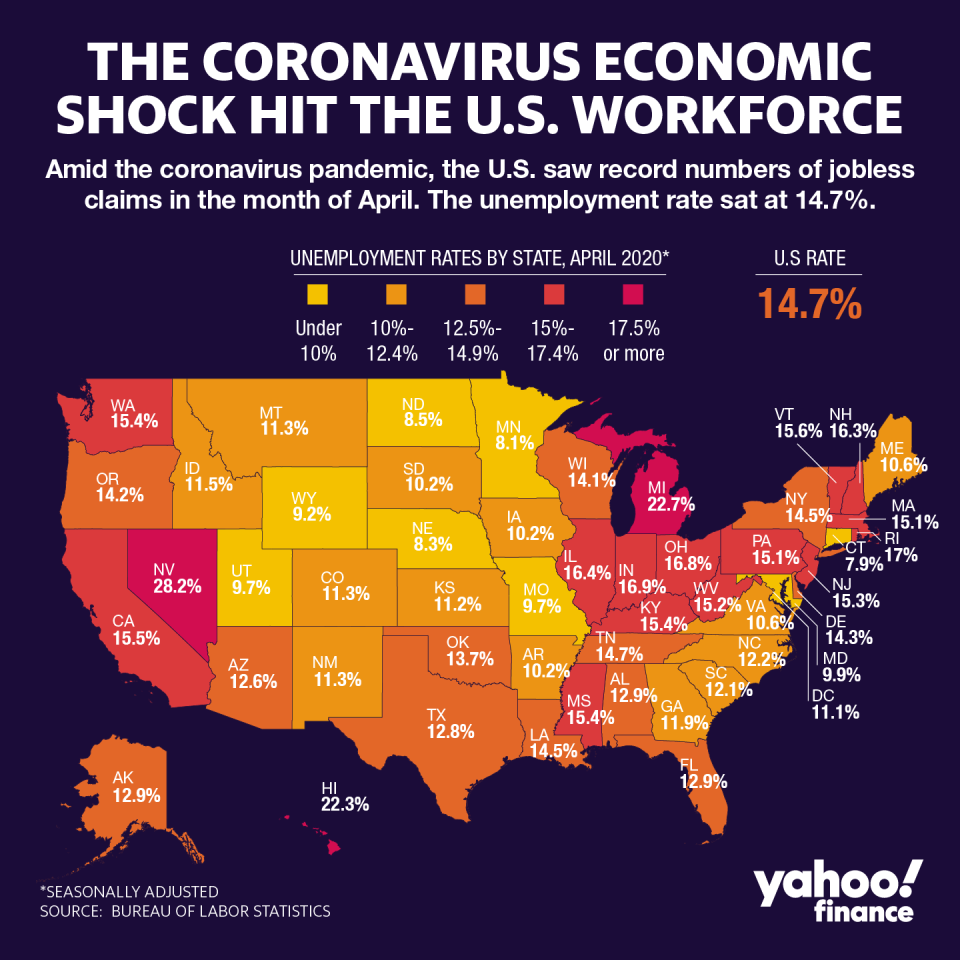An unemployment surge in swing states is endangering Trump's re-election chances
More than 40 million Americans have applied for unemployment benefits over the past 10 weeks as the coronavirus pandemic has brought the U.S. economy to a standstill. As terrible as that number is, that fact alone is not bad news for President Trump’s re-election chances.
What could be, is that key swing states are being hardest hit with job layoffs — and that voters aren’t seemingly putting the blame on Democrats.
Consider the crucially close swing states that delivered President Trump to the White House in 2016: Michigan, Pennsylvania, and Florida. Against Hillary Clinton in 2016, Trump managed to turn Michigan and Pennsylvania red — each for the first time since 1992 by a slim margin (the slimmest margin for Pennsylvania in 176 years.) He won Florida by the slimmest margin for a Republican since the state’s “hanging chad” controversy in 2000. Just three states, yet so much power.
That’s why its particularly worrisome for President Trump’s re-election chances to note that unemployment rates in those key swing states have been particularly high relative to the rest of the country since the coronavirus pandemic rattled the economy.
As last week’s Department of Labor jobs report highlighted, all three states have a higher unemployment rate than the national average at 14.7%. Michigan’s 22.7% unemployment rate trailed only Nevada’s for the second highest jobless rate out of all 50 states. This week’s unemployment claims data showed both Florida and Michigan placed in the top five of states in terms of insured unemployment rates in the country, measured as the percentage of people on unemployment benefits divided by a state’s labor force.

Of course, unemployment numbers by themselves are not enough to calculate which way a state is leaning in any election. As political science platform FiveThirtyEight has previously highlighted, a worsening job market doesn’t necessarily mean bad news for an incumbent, but it doesn’t necessarily help, either. And considering the unprecedented spike in unemployment was initially sparked by a public health crisis, (that President Trump increasingly reminds everyone started in China) perhaps that dampens any correlation further.
However, looking at how voters in these swing states are analyzing President Trump’s handling of the crisis versus how they rate their state governors’ handling of things reveals more problems for the president. Putting aside Florida, which is governed by Republican Ron DeSantis, approval ratings for Democratic governors in Pennsylvania and Michigan reveal voters are more approving of how they are responding to the crisis at a local level.
A Detroit Regional Chamber of Commerce statewide survey conducted this month showed voters in Michigan pegged a 63% approval to the job done by Democratic Gov. Gretchen Whitmer compared to Trump's 42% approval. A Pennsylvania voter Survey Monkey poll likewise pegged Gov. Tim Wolf’s approval at a similar 64%. Those polls, coupled with other presidential voting polls that show Trump trailing former Vice President Joe Biden in Michigan, Florida and Pennsylvania, according to RealClearPolitics averages, do not bode well for his re-election chances.
As analysts at ING recently summarized, “The latest polling suggest Joe Biden is leading Donald Trump by 4-7 percentage points and getting jobs created will be crucial to President Trump’s re-election hopes.”
Perhaps that explains the recent push by White House economic adviser Larry Kudlow to advocate for a bonus incentive in the next wave of coronavirus relief measures to lure American workers off unemployment benefits that also come with an added $600 in federal aid passed in the Coronavirus Aid, Relief, and Economic Security (CARES) Act.
Whether those efforts or businesses reopening across those states get unemployment rates back down in key swing states remains to be seen. For the time being, the relatively worse unemployment picture isn’t helping his chances.
Zack Guzman is the host of YFi PM as well as a senior writer and on-air reporter covering entrepreneurship, cannabis, startups, and breaking news at Yahoo Finance. Follow him on Twitter @zGuz.
Read the latest financial and business news from Yahoo Finance
Read more:
Most 2020 grads are desperate and applying for jobs that aren't the right fit: Monster
Why Trump’s plan to curtail immigration will slow the coronavirus recovery
Small US towns are neglected from coronavirus relief and it's a 'slap in the face': Georgia mayor
Follow Yahoo Finance on Twitter, Facebook, Instagram, Flipboard, SmartNews, LinkedIn, YouTube, and reddit.
